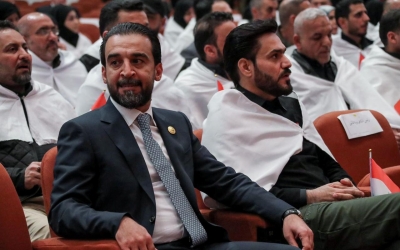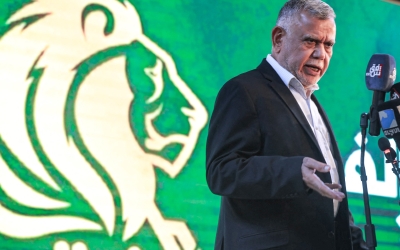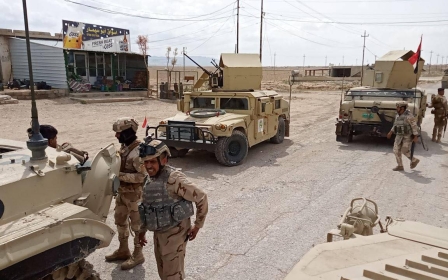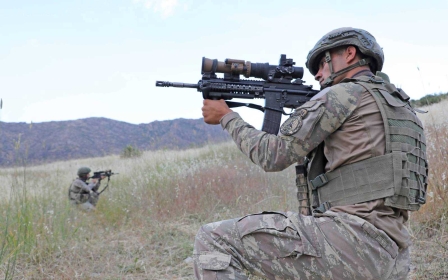Iraq: Sadr bets on keeping PM Kadhimi and using political limbo to edge out rivals
Fresh from offering Iraq’s independent MPs the chance to nominate a prime minister, Muqtada al-Sadr is already looking at the next option to break the country’s political stalemate: keep Mustafa al-Kadhimi.
It’s seven months now since Iraqis went to the polls in October’s parliamentary elections, and fierce rivalry between two camps - one led by influential Shia cleric Sadr, the other backed by Iran - has stopped anyone from forming a government.
A week ago, Sadr called on the 40 or so independents elected to parliament to form their own bloc and nominate a prime minister that his alliance - made up of Sadr’s MPs, Sunni parties and the Kurdish Democratic Party (KDP) - would support.
'We will not allow the country to be held hostage. We will implement the constitution'
- Prominent Sadrist leader
Yet Iraqi political leaders involved in government-formation talks told Middle East Eye that Sadr has little expectation they will do so, and instead is looking at keeping current prime minister Kadhimi in place for six months to a year.
"Sadr is not in a hurry to form a government. Keeping the current situation as it is for six months or a year is one of the solutions now being strongly proposed," a prominent leader of Sadr’s Save the Homeland alliance, who is close to KDP leader Masoud Barzani, told MEE.
New MEE newsletter: Jerusalem Dispatch
Sign up to get the latest insights and analysis on Israel-Palestine, alongside Turkey Unpacked and other MEE newsletters
"There is no circumstance or factor, local or international, pressuring any of the players in the tripartite alliance to expedite the formation of the government,” he added.
"If we talk about the United States, it is busy elsewhere in the world and is not much concerned with what is currently happening in Iraq. As for Iran, the continuation of the situation is less harmful than the outbreak of Shia-Shia fighting."
Getting parliament moving
Sadr already holds great sway over Kadhimi’s government, and in October his Sairoon Alliance party emerged the clear victor. Since then, he has tried to form a “majority government” alongside his Kurdish and Sunni allies that would sideline Iranian-backed Shia factions, who together are known as the Coordination Framework.
Unhappy about being frozen out of the next government, those factions have boycotted parliament and ensured a quorum cannot be reached to continue the government-formation process. But permanent stasis would also be damaging.
If Sadr is able to continue monopolising control through his control of parliament and Kadhimi’s government, the Iranian-backed groups will find their influence and power waning.
To prove his plan’s seriousness, Sadr has not waited for his two-week deadline to independents to expire before making his next moves. He and his allies have declared parliamentary work will continue, regardless of whether the boycotters attend or not.
Though two-thirds of MPs are needed to sit to elect a president and nominate a prime minister, just half (166 MPs) can pass most legislation. Sadr and his allies have 186.
The parliament’s leadership - the speaker and his two deputies - is made up of Mohammed al-Halbousi, head of the Sunni bloc, a Sadrist and a member of the KDP, and they have promised to get parliament moving.
Hakim al-Zamili, the Sadrist deputy speaker, on Monday informed the heads of the parliamentary blocs that appointments to parliamentary committees have been decided and work to appoint them will begin immediately, three MPs told MEE.
As for legislation, first on the list that needs to be passed is the annual budget. But the current disputes, the lack of sessions of parliament and the delay in the formation of parliamentary committees have prevented its approval so far.
With no budget, government projects, offices and social welfare networks could soon run out of cash. To avoid this, Sadr and his allies last month submitted a “mini budget” draft they called the “food security and development” law for an urgent vote.
The law would see monthly amounts of up to 35 trillion Iraqi dinars ($23bn) from the surplus monthly oil sales, international grants and donations, and loans, secured and deposed in a bank account controlled by the finance ministry.
Essentially, it would keep the country going for several months without approving the annual budget.
Voting on the “food security” law was scheduled to take place this week.
"We will not allow the country to be held hostage. We will implement the constitution, and the constitution says that there is a legally recognised parliament, a parliament speaker, a president, a prime minister and a government,” a prominent Sadrist leader told MEE.
“Practically, there will be no problem if a new government is not formed for another few months. We have a parliament and a government, which will both carry out their duties without any trouble.”
Sidelining Iran's allies
Before Sadr’s election victory and his calls for a majority government, Iraq was governed by consensus.
Since 2003, political forces have operated under a power-sharing agreement, where influential offices and positions - both civilian and military - are divvied up between parties along the lines of representation in parliament. Some are given on the basis of courtesy and favouritism, some are given as a reward.
Only parliament can approve appointments to these positions.
But devoid of political consensus and amid fierce competition between the parliamentary blocs, over recent years Kadhimi and his predecessors have had to fill positions by appointing temporary “acting” officials, circumventing the parliamentary process.
For nearly two decades, Iranian-backed forces have dominated the Iraqi government and parliament, and they hold almost two-thirds of senior positions.
This percentage will change "completely", and appointments without parliamentary approval will "end soon", Sadrist leaders told MEE.
A prominent Sadrist MP told MEE that Sadr’s alliance has the power to continue or dissolve parliament, and the situation as it stands does not hinder his project.
“On the contrary, it greatly harms its opponents,” he said.
The Sadrist said moves will be made to appoint new officials as soon as the deadline given to independents expires.
“There is a new philosophy for the administration and this philosophy needs new men. Accordingly we will work to replace the old team with a new one,” he said.
"We will end running the country by proxy. This is what everyone wants and this is what we will do."
Middle East Eye delivers independent and unrivalled coverage and analysis of the Middle East, North Africa and beyond. To learn more about republishing this content and the associated fees, please fill out this form. More about MEE can be found here.






